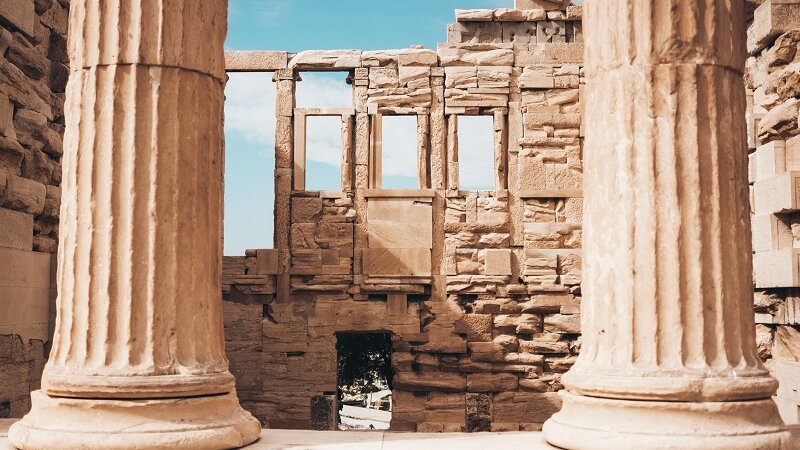Skepticism: Abstaining from Judgment
Episode #6 of the course Ancient Greek philosophy by Dr. Will Buckingham
In today’s lesson, we’re moving onto another important and long-standing tradition in Greek philosophy, one that still has an influence today: the tradition of skepticism.
No Way Back
Skepticism uses the division between appearance and reality to call into question all our certainties. Many ancient Greek philosophers agreed that the world was not how it appeared to be, that a different reality was behind the appearances of things. For most of these philosophers, this was a challenge to try and work out how things really were, apart from how they appeared. The skeptics, however, took a different approach. They asked: What if we can’t make our way back from appearances to reality? What if we can’t actually know anything at all for certain?
A Well-Traveled Philosopher
The most famous skeptical philosopher in the Greek world was Pyrrho of Elis (born c. 360 BCE). According to later accounts, Pyrrho started life as a painter before becoming a philosopher. Perhaps his training in painting caused him to think more deeply about appearance and reality, perception, and truth.
Pyrrho was well-traveled. He accompanied Alexander the Great on his expedition as far as the Indus river, where it is likely that he encountered South Asian traditions of philosophy. When he returned home, Pyrrho committed himself to living a solitary life, perhaps in emulation of Indian sages. Pyrrho died around 270 BCE. That we know about his philosophy at all is thanks to his student, Timon of Phlius, who wrote down his teacher’s doctrines.
The Impossibility of Knowledge
The question of knowledge, or whether we can know anything for certain, is a recurrent one in philosophy. From Plato, we know that there are two main sources of knowledge: the senses and the intellect. In his view, the senses are misleading. They can only give us knowledge of appearances, not of the underlying forms. But the intellect can give us pure, true, eternal knowledge. Pyrrho agrees with the first argument: The senses are misleading. But he disagrees with the second argument, insisting that the intellect is not a reliable source of knowledge either.
This leaves us, Pyrrho says, with the dispiriting conclusion that we can’t know anything at all for certain.
What Is Philosophy For?
That may seem like a defeatist philosophy. But Pyrrho’s skepticism had a positive intention. He was not interested in resolving questions about knowledge. Instead, he was interested in the way that our commitments to particular kinds of knowledge tend to tangle us up and make our lives worse. If we commit ourselves to knowledge, we are almost certainly committing ourselves to the impossible. In trying to do the impossible — to know things for certain — we just tangle ourselves up in mental distress. We fall out with each other. We disagree. We worry about truth and untruth.
But if we abstain from judgment about truth and falsity, this allows us to become free from disturbance and distress. Pyrrho calls this abstinence from judgment, “epoche,” and the freedom from disturbance that results from this suspension of judgment, “tranquility” or “ataraxia.” In other words, philosophy is not about attaining knowledge or wisdom: If we are committed to these goals, we will never be happy. Instead, it is about attaining tranquility.
The Problem with Scepticism
This tradition of skepticism persisted throughout ancient Greece and became more important in Roman times. Even today, the question about how certain our knowledge is continues to recur.
But there is a problem with the claim that certain knowledge is impossible. In making this claim, it sounds like we are certain about the impossibility of certainty. So, it looks as if we are contradicting ourselves.
The ancient skeptics were not unaware of this problem. Some of them preferred to say that “it seems” that certain knowledge is impossible. For many people, this kind of slippery argument looked like cheating. But if like Pyrrho, we believe that ataraxia, or tranquility, is more important than knowledge, then maybe this isn’t a cheat after all. Instead, it is a refusal to play the game of knowing and not-knowing, so we can commit ourselves instead to freeing ourselves from disturbance.
Skepticism Today
Skepticism recurs throughout the history of philosophy, as a challenge to dogmatism and certainty. Even if we don’t agree with Pyrrho and aspire to attain tranquility through abstaining from judgment, the skeptical challenge is always there: the challenge to look closely at our certainties and ask how certain they really are.
Philosophical Practices
Perhaps you are still feeling skeptical about skepticism. Many people do! Perhaps your skepticism has tipped over into cynicism. If so, then you may be happy to learn that cynicism is another important school of ancient Greek philosophy. This will be the topic of the next lesson.
Recommended resources
• Jennifer Nagel’s YouTube video on “The Problem of Skepticism” explores why skepticism is such an enduring philosophical issue.
• Philosophy Now magazine has an interesting piece on Pyrrho and ataraxia in the internet age.
Share with friends

